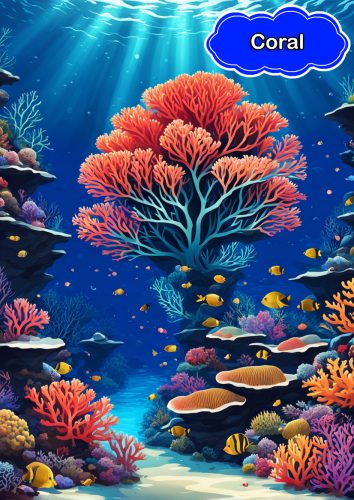
Here are some lesser-known facts about coral:
- Coral is Not a Plant: Despite being often mistaken for plants, corals are actually marine animals belonging to the phylum Cnidaria. They are closely related to jellyfish and sea anemones.
- Symbiotic Relationships: Corals have a symbiotic relationship with tiny photosynthetic algae called zooxanthellae. These algae live within the coral’s tissues, providing energy through photosynthesis while receiving protection and nutrients in return.
- Growth Patterns: Corals grow very slowly, typically just a few millimeters to a couple of centimeters per year. Some species can take hundreds to thousands of years to form large reef structures.
- Reef Diversity: Coral reefs are among the most diverse ecosystems on Earth, supporting about 25% of all marine species. This includes fish, invertebrates, and various marine plants.
- Color Variation: The vibrant colors of corals are due to the presence of zooxanthellae and various pigments in the coral tissue. When stressed, such as from rising water temperatures, corals can expel these algae, leading to a phenomenon known as coral bleaching.
- Reproductive Strategies: Corals can reproduce both sexually and asexually. Many species release eggs and sperm into the water during mass spawning events, while others can clone themselves by budding.
- Importance of Coral Reefs: Coral reefs provide crucial services, including coastal protection from storms, habitats for marine life, and support for fisheries. They also contribute to local economies through tourism.
- Threatened Ecosystems: Coral reefs are among the most threatened ecosystems globally, facing challenges such as climate change, ocean acidification, pollution, and overfishing. Significant portions of coral reefs are at risk of degradation.
- Ancient Structures: Some coral reefs date back thousands of years. The Great Barrier Reef in Australia, for example, is estimated to be around 20 million years old.
- Medicinal Potential: Corals and the organisms associated with them have been studied for potential medicinal compounds. Some have shown promise in cancer treatment and other medical applications.
These facts highlight the complexity and significance of coral ecosystems in our oceans!
More resources:
Animals Coloring and Learning eBook
Animals Free Fun Learning eBook
Notes:
– All materials are strictly for personal use only.
– Do not reproduce and/or redistribute any part of these materials.
– Use these materials under parents’ and/or guardians’ guidance/supervision/approval.
![]()